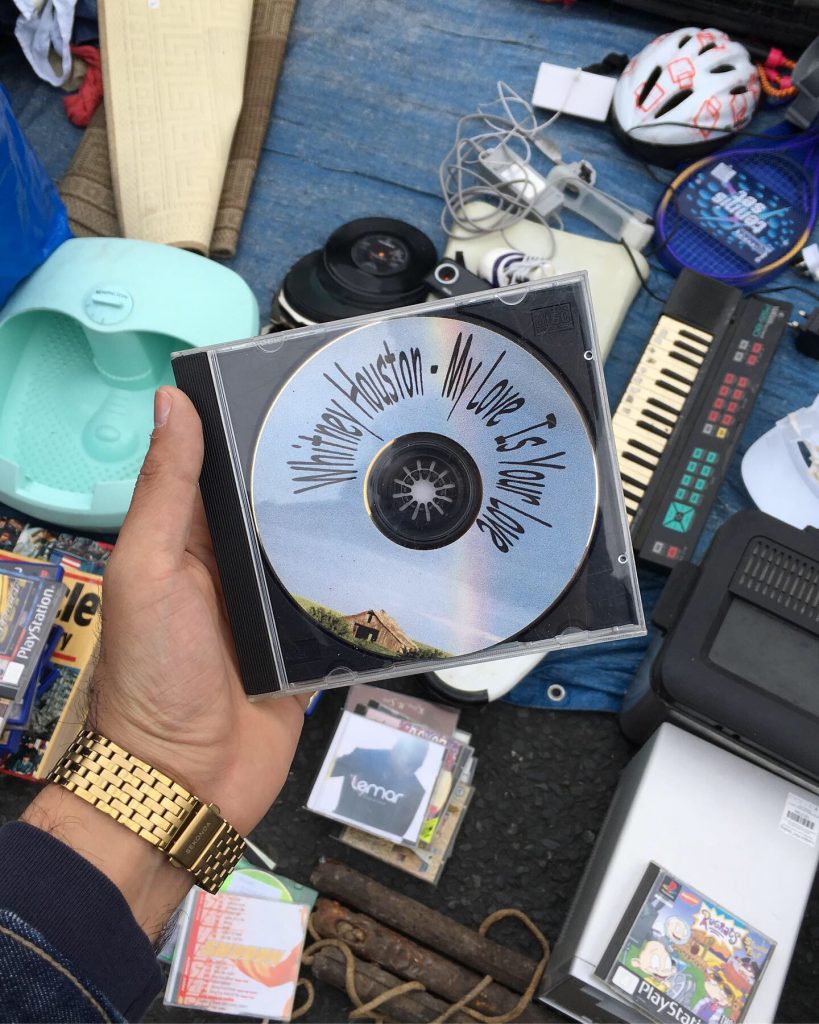Responds to MEDICATED SUMMERS / BENEFITS TRAP / ENDS PORTALS by Adam Farah

Other than through the mailing list or a ‘link in bio’, flatness.eu’s project with artist and composer Adam Farah (free.yard) can be accessed via hyperlink on the online moving-image platform’s homepage. Farah’s MEDICATED SUMMERS / BENEFITS TRAP / ENDS PORTALS is listed among the seven other projects commissioned by flatness.eu curator Shama Khanna on the platform for 2019 and was launched during the summer-closing season in August.
MEDICATED SUMMERS… is both a short piece of music-video and a downloadable pdf. The video images a quotidian moment (search: Mariah Carey moment) made weird; the cameraperson’s chest moves backwards on the high street underneath the music: Sugababes’ live performance of their song “Stronger”, playing on an electric blue PlayStation Portable (PSP). But this feels like a Noir: a slow, hazy amble across town, green-screen moment.
Rear Projection, a Hollywood golden age go-to technique, allowed filmmakers to both record audio and place characters in front of anything from a soul-destroying monster to a bustling high street crossing. This technique, and other set-dressing style devices used to conjure an affective street scenes, on their way to obsolesce as ‘special effects’, were repurposed through pastiche in a number of 1980s and 1990s pop music videos, for example those of Janet Jackson (Come Back to Me (1989)) and Whitney Houston’s “I Will Always Love You” in which a seated, solitary Houston is transposed atop various, possibly rear-projected, scenes from her own The Bodyguard (1992).
Special effects that become outmoded as clumsy, cumbersome and unrealistic, when they are resurrected through artistic gesture, seem too ripe for interpretation as tongue-in-cheek or ironic. But would this Sertraline pilgrim in MEDICATED SUMMERS…, walking in the ‘thickness of the dry summer air pushing against your skin, slowing…you……down. That endz haze, you know…’ (from website text) bother with irony or jest? I think that these aesthetic devices in Farah’s Music-Video reprise, which also reminds me of the very weird Craig David “Walking Away” (2000) video and its use of passe special effects. Farah’s practice could be read against the emotive thickness (this is also called affect) conjured by the same long 90s RnB and Pop artists that Farah uses as their own theoretical underpinning. MEDICATED SUMMERS / BENEFITS TRAP / ENDS PORTALS needs you to wade slowly through Sugababes’ moment in the endz.
Farah has also included a downloadable pdf: some images to read. Downloading information, whether a pop track from a peer-to-peer platform, or an essay on the latest G-drive treasure trove of queer theory starts to respond to, or perhaps hold on to, what was formative for so many in the pre-2000s internet that flatness.eu curator Shama Khanna recalls as “what the internet might [have been]” (spike magazine interview).
free.yard’s practice is described on the site as an artist and composer, but to that I would also add an archivist, one for whom the organising principles of that archive might be a history of that which is outmoded through technological optimism: the (low budget Music-Video) aesthetics and the clunky hand-held devices, as well as the those in the ends who make use (even if just making do) both of these things. Farah’s MEDICATED SUMMERS… also serves as a record of a particular ‘moment’ in London’s ongoing gentrification process. In Patrick Keiller’s, ‘London’ (1994) he remarks that the city ‘has always struck [him] as a city full of interesting people who, like Robinson, would prefer to be elsewhere’, but in MEDICATED SUMMERS… , the portal to elsewhere seems not simply a matter of preference, but of compulsion.
Farah’s practice of downloading files, pulling things down from the cloud to earth, and uploading them for others, feels like a perpituity measure. Their extensive self-directed research into the outmoded technology housed in archives across London, (For example: Stuart Hall Library’s collection of works made on CD-ROM) is a remembering of some of the more compelling activity on the internet pre-2000s, a period of which Flatness seems to be looking to recapture the spirit.
flatness.eu, which began online as a programme at IRL festival Oberhausen in 2013, looks to platform ‘cinema after the internet’ (flatness.eu website), but unlike other sites that house moving image work online (vdrome, Mubi) that publish through content on a periodically, flatness.eu appears to serve as a more-permanent collection and meeting place (there is a calendar and comments section).
Though I would be interested to experience more of free.yard’s films at human architectural scale (What size is this portal that I have to get through?), it seems that an online platform is a much-needed portal for those dog days, which hit even in summer, where leaving the house seems as impossible as a backwards stroll under a Playstation Portable LCD screen sun.
Taylor Le Melle is a member of not/nowhere, an artists’ workers cooperative.